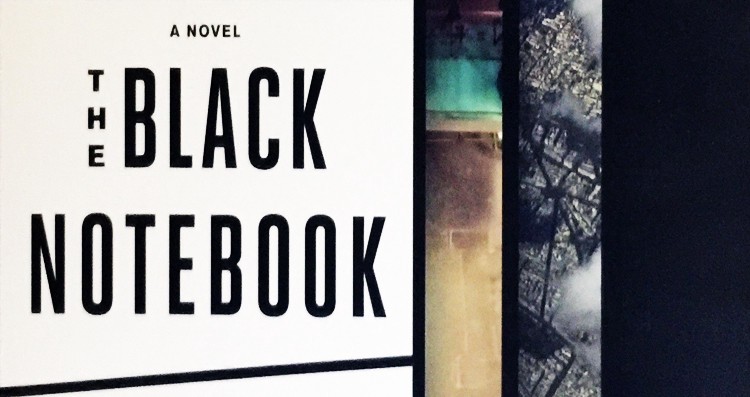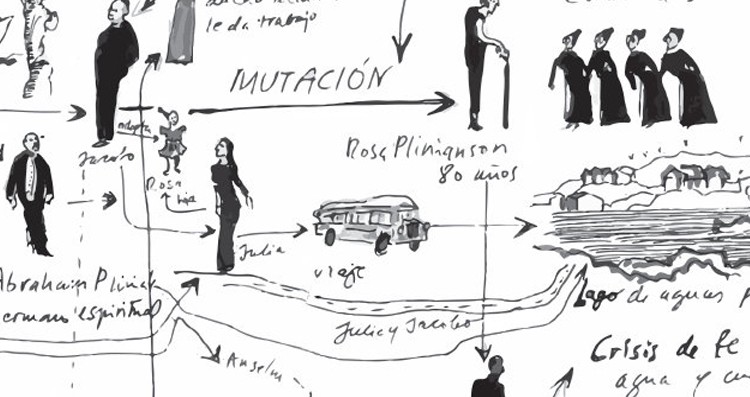Books & Culture
Modiano Wants You to Think that Severe Memory and Identity Issues Are Universal
The slim novel’s use of withholding information creates an amplified sense of possibility

Every novel is a confusing mix of the particular and the universal, and it’s often the reader’s job to disentangle just how much of the book she’s reading is simply an expression of particular circumstances, and how much of it speaks of a truth universal to humanity. This task is rarely easy, since every novel depicts particular people doing particular things in particular situations, yet at the same time all novels can be related on at least an abstract level to some common aspect of human experience. As such, the difficulty resides in knowing just which aspects of a story are genuinely universal to human existence, and which are merely specific to a particular kind of person, appearing ‘universal’ only at inconsequential levels of abstraction.
This is the difficulty that attaches to The Black Notebook, the latest novel by Patrick Modiano to be translated into English. Just like its preceding translation, So You Don’t Get Lost in the Neighborhood, it appears to handle the kind of universal themes for which the French author won the Novel Prize in 2014: the vagueness of perception and consciousness, the fragility of memory, and the destabilizing effect this vagueness and fragility have on one’s own identity. However, when reading through the book’s 131 pages, it slowly becomes evident that these themes arise in the book only because of the particular predicament of its main protagonist, Jean. Contrary to what Modiano may have hoped, the novel doesn’t actually prove their universality, instead demonstrating that, in this case at least, they emerge as a result of evasive lovers and a lack of existential purpose.
“The vagueness of perception and consciousness, the fragility of memory, and the destabilizing effect this vagueness and fragility have on one’s own identity.”
Nonetheless, before this introduction creates the impression that The Black Notebook lacks purpose itself, it should be affirmed that the book is every bit as absorbing and beguiling as anything else Modiano has written to date. A translation of his 2012 novel, L’Herbe des nuits (“Grass of Nights”), it plots the aforementioned Jean as he narrates his attempts to piece together a fragmented episode of his life from the ’60s, using nothing more than the eponymous black notebook and his own shaky memory. What this means is that it follows him as he shifts back in time to his youth, which is remembered via a series of scenes that are intoxicating precisely because they’re so incomplete, elliptical and ambiguous.
For some readers, such incompleteness and ambiguity might be alienating, yet it’s very much the withholding of information that makes The Black Notebook so peculiarly rich. When Jean recounts his relationship with Dannie, a young woman staying at the Cité Universitaire in Paris, there are always several details missing and several things left unsaid. As such, a multitude of suggestions and allusions insinuate themselves into the gaps that remain, working via imagination to create an amplified sense of possibility where there is in fact only an absence of information. To take a simple example, when the earlier stages of the novel witness Jean as he muses, “She seemed determined to avoid an awkward question,” such a phrase isn’t meant to stop the narration dead in its tracks, but rather to imply the almost countless things that Dannie could be hiding from Jean regarding her past.
“The Black Notebook is awash in a seductive atmosphere that feeds off the obscurity of its supporting characters.”
As a result, The Black Notebook is awash in a seductive atmosphere that feeds off the obscurity of its supporting characters. Aside from the slippery Dannie, there’s the no-less enigmatic Aghamouri, a taciturn thirty-something Moroccan who may or may not be a student. Then there are the shady likes of Paul Chastagnier, Duwelz, “Georges,” and Gerard Marciano, a loose-knit gang who frequent the Unic Hôtel in Rue du Montparnasse, and who are somehow connected to Dannie’s unexplained presence in the Cité Universitaire. What this connection might be is essentially what Jean spends the bulk of the novel trying to establish, yet it soon becomes apparent that his biggest problem is simply remembering his own past with any appreciable degree of clarity and consistency.
Indeed, he compares the fuzziness of his memories to how a “train rushes by a station too fast for you to read the name of the town.” He complains of the indistinctness of the Unic Hôtel bunch, of how “Their outlines have grown hazy with time, their voices inaudible.” Even when he does actually manage to recall some specific event or person, he laments of how the “details return to [him] fitfully, in a jumble, and often the light grows dim.”
Worse still, the imprecision of his memories are regularly contrasted against the precision of the notes he kept at the time in his black notebook, which deceptively makes it seem as though his remembrances are failing to grasp a lucid and unambiguous past. In its definite “succession of names, phone numbers, appointments, and also short texts” it invokes an unequivocal yesterday, yet because Jean can’t actually remember this yesterday with any assurance, it ironically serves to make him feel divorced from his own past, so that he comes to think that “another me, a twin, was prowling around there, and who was still living — down to the smallest detail.”
Yet rather than working to create the sense that people in general are always being irreversibly dislocated from their previous selves, The Black Notebook soon reveals that Jean’s memories are murky mainly because the way he experienced the present was already murky. Halfway through the novel, while having a particularly revealing conversation with the elusive Aghamouri, he remarks to himself, “It felt like a dream. This often happened in that period of my life, especially after nightfall.” Later, he acknowledges a similar blurriness to his then-present experience when he admits, “It seems to me that back then I saw them all as if they were behind the glass partition of an aquarium, and that glass stood between them and me.” From such admissions, it’s gradually divulged that the fallible memory which Jean spends much of his narration lambasting is actually a scapegoat, a fall guy meant to preserve him from the upsetting realisation that even his present consciousness is a bleary mess.
And even if at this point it appears as though the novel is some kind of comment on the deficiency of human consciousness and experience, it once again becomes hard to shake the conviction that Jean’s inability to see his reality clearly is mostly a product of his relationship with Dannie. Rather than it being the case that she and people in general are inherently unknowable, it’s quite palpable from the novel’s first few pages that she’s hiding something. Actually, she’s not hiding merely “something,” but rather her entire identity, which she keeps locked in the past, away from Jean. He soon comes to “understand that you couldn’t ask her anything directly,” while she resists his every attempt to learn more about her cloaked backstory. Halfway through the novel, he learns from Aghamouri that she’s excessively guarded only because she was involved in a “nasty incident.” Unfortunately, when he quizzes her about said “incident,” all she says is, “he told you that I got myself involved in a nasty incident? And you believed all that, Jean?”
“[T]he novel is some kind of comment on the deficiency of human consciousness and experience.”
It’s because of her evasions and subterfuges that Jean experiences his present and past as an indistinct cloud. As the most important figure in his life at that time, she becomes the prism through which he perceives the rest of the world. However, because “She offered no explanations” as to her shady past and sometimes “contradicted herself,” this prism isn’t especially helpful when it comes to framing his own life in any reliable, detailed or coherent way. This is why he “wasn’t certain of [his] own identity,” and why he refers to his memory as a “mysterious correspondent” who sends him signals “from the far reaches of the past,” and not because this identity and this memory are intrinsically unstable.
Part of the reason why they seem so unstable, and why Jean’s movements through the novel come across as almost aimless, is that Dannie’s caginess effectively deprives him not only of certainty as to what’s going on between them, but also of a purpose or object in life. There are several moments during the novel which reveal that he regards her as this purpose or object, but which also reveal that she’s far too distant and inaccessible to ever really fulfill the role he desires for her with any reliability. For example, we often catch him waiting in a kind of existential suspense for Dannie, whose absence has the effect that “time throbs, dilates, then falls slack again; how it gradually gives you the feeling of vacation and infinity.” When she finally reappears from the dark, this feeling of vacancy appears to close for Jean, who at one point remarks, “I sometimes felt I had lost my memory and couldn’t understand what I was doing there. Until Dannie returned.”
Yet even though this feeling disappears, Dannie’s secretiveness means that, actually, the void remains there, lingering under the surface. Because she’s too unforthcoming and withdrawn, she can never really provide Jean with a clear and constant raison d’être. She refuses to be the stable point of reference through which he could gain some biographical bearings, and because of this he loses any concerted notion of where he’s going in life. He walks through the boulevards of Paris “shrouded in a halo of fog,” having “doubts about the authenticity of [his own] birth certificate.” And if he spends the vast bulk of the novel drifting through an indeterminate, collapsed time that’s neither present, past nor future, it’s because he lacks a single, continuous thread that can knit every moment of his life into a sequential, linear progression.
“[T]he main draw here is the mysterious ambiance, the intimation that our world vastly exceeds what we can comprehend and know of it.”
In other words, Modiano paints him as a reflection of the shadowy people who surrounded him and of his own environment, as much a wavering ghost of his memory as the occult figures he vainly tries to reconstruct and understand. Admittedly, this might make the novel sound frustrating or unsatisfying in its cagey refusal to offer any definitive answers or substantial revelations, yet it has to be repeated that the main draw here is the mysterious ambiance, the intimation that our world vastly exceeds what we can comprehend and know of it. Almost counterintuitively, it sucks the reader in via its seamless exploitation of negative space, using this space to conjure suspicions of so much more than would’ve been conjured if Modiano had written a more straight-talking narrative.
In some ways The Black Notebook is straight-talking, however. Modiano’s prose, as well as Mark Polizzotti’s faithful translation, is constituted by terse sentences and tense observations. Nearly every line is concentrated and punchy, which somehow makes the uncertainty and equivocality all the more impacting. This is perhaps because, in keeping what’s said to a concise minimum, Modiano maximizes what’s left unsaid, thereby widening the latter’s scope and making it more suggestive. Yet it’s also because the juxtaposition of succinct, ostensibly clinical language with a thick layer of doubtfulness ultimately reinforces the poignant contrast already created by the transparent simplicity of Jean’s black notebook and the opaque complexity of the events to which it vainly tries to refer.

In the end, it’s this gulf between the nominal coherence of language and the fundamental incoherence of reality which The Black Notebook appears to be all about. It’s sets itself up as a novel on our failure to make ‘knowledge’ and reality correspond in anything more than a tokenistic manner, as encapsulated by Jean himself when he explains, “I wrote down very few appointments in that black notebook. Each time, I was afraid that the person wouldn’t show up if I committed the date and time in advance.” And yet, as explained above, the impression of the “fundamental incoherence of reality” is for the most part an artifact of Jean’s social milieu and his love interest, Dannie. She never reveals herself to him, and so because of her crypticness, reality itself comes to seem cryptic. This is why, despite its utterly engrossing atmosphere and unassuming eloquence, The Black Notebook doesn’t quite prove the universality of its own themes.







